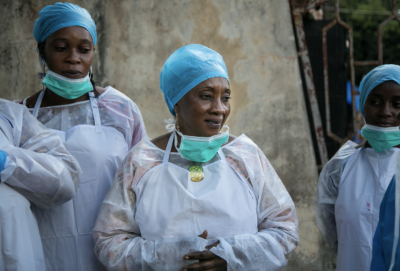The USC Institute on Inequalities in Global Health (USC IIGH) has witnessed how harmful COVID-19 is to highly vulnerable populations worldwide, including the elderly, the sick, the poor, the criminalized, sexual and gender minorities, and those facing persistent discrimination and exclusion.
Women sick with COVID-19 symptoms are prevented from visiting a clinic because they cannot be in contact with men other than their husbands, and they’re not allowed to stay in hospitals alone. Police officers are detaining and fining people living with HIV who are trying to secure antiretrovirals during a lockdown. There are many examples. All raise concerns about how increased state powers brought to bear to fight the pandemic have led to widespread misuses and abuses.
 To address these rising human-rights concerns and their impacts on public health, USC IIGH has launched efforts with partners at the global level and in countries in Asia, Africa, and Latin America.
To address these rising human-rights concerns and their impacts on public health, USC IIGH has launched efforts with partners at the global level and in countries in Asia, Africa, and Latin America.
“Right now, it is vital that we advance research projects that address the rising inequalities brought to light by this pandemic,” said Prof. Sofia Gruskin, JD, MIA, Director of USC IIGH. “This period of global difficulty unfortunately creates the opportunity for countries to backslide on progress on issues of equality, sustainability, and equity to advance policies that not only unfairly target vulnerable groups but worsen health and other social outcomes.”
While much of the work at USC to date has focused on the responses of the United States and other wealthy countries, IIGH is working to fill in the map from other parts of the world. Recently, work with the United Nations as part of the expert working group led to global guidance relating to COVID-19 and human rights with a publication titled “Rights in the time of COVID-19 — Lessons from HIV for an effective, community-led response.” Additional guidance was developed in the form of a World Health Organization document titled “Addressing Human Rights as Key to the COVID-19 Response.” These resources focus on the needs of affected communities while highlighting the need to ensure government responses take precautions to protect human rights.
To examine the impact of the virus on sustainability and sustainable development, the Institute is preparing to launch a study titled “COVID-19 and Inequalities: Policy Development, Implementation and Impact” in four countries in sub-Saharan Africa. It’s being done in partnership with Amref Health Africa and the African Population and Health Research Centre. The project will identify and promote legal and policy responses that can successfully mitigate the spread and impact of the virus, particularly among the disadvantaged. This study addresses not only the immediate impacts of these policy directives but their broader implications for food security, sexual and reproductive health and rights, access to health and social services, and health outcomes more generally.
Work is already underway in Brazil on the effects of COVID-19, focused on the impacts of the pandemic on the sexual and mental health of Brazilian adolescents, adult gay men and other men who have sex with men, and transgender women. These groups are participating in two ongoing cohort studies on the use of pre-exposure prophylactic (PrEP) for HIV prevention. And, in partnership with five Brazilian universities, they’re among several projects with partners in other regions of the world that are presently under development.
As the IIGH team continues its work with the World Health Organization, UNAIDS and other country-based partners, Gruskin says a rights-oriented approach is both critical to fighting the disease and to aiding in a recovery that doesn’t exacerbate but actively seeks to reduce existing disparities.
“Human rights must be a primary, not secondary, consideration in developing policies both at the height of this outbreak and when cases finally begin to abate. Socio-economic equality, issues of food security, adequate shelter, privacy protections, protection against discrimination — these concerns cannot be ignored to address the COVID-19 pandemic, as that would lead to a worsened global response, poorer health outcomes, and increasingly fractured and disadvantaged communities in the future.”
— by Shervan Sebastian
